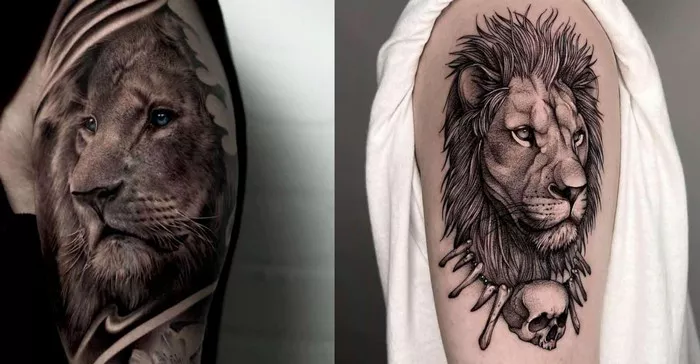In the world of tattoo artistry, lions have established themselves as one of the most popular and meaningful motifs. Their majestic appearance and rich symbolism make them a compelling choice for those seeking to adorn their bodies with permanent art. Lion tattoos can carry various meanings, deeply rooted in cultural, historical, and personal contexts. This article delves into the multifaceted symbolism behind lion tattoos, exploring their significance across different cultures, their representation in mythology and religion, and what they signify on a personal level to those who choose to ink them on their skin.
Cultural and Historical Significance
Lions hold significant cultural and historical importance in various societies across the globe. In many African cultures, the lion is revered as a symbol of strength, courage, and royalty. Ancient civilizations, such as those in Egypt, associated lions with deities like Sekhmet, the lion-headed goddess of war and healing. In Asia, particularly in countries like China and Japan, lions are seen as guardians and protectors, often depicted in sculptures and artwork at the entrances of temples and shrines.
The lion’s symbolism as a creature of power and authority extends beyond its natural habitat into human societies throughout history. This cultural significance is often reflected in tattoo designs, where the lion’s attributes are celebrated and embodied by those who choose to wear them.
Symbolism in Mythology and Religion
Mythology and religion have also played a significant role in shaping the symbolism of lion tattoos. In Greek mythology, the lion was associated with gods and heroes, such as Hercules who famously battled and defeated the Nemean lion. The lion’s portrayal as a formidable and unbeatable adversary underscores its symbolism of strength and resilience.
Similarly, in Christianity, the lion is often used as a symbol of courage, protection, and the triumph of good over evil. The imagery of the lion as the “king of the jungle” resonates with biblical references to Jesus Christ as the “Lion of Judah,” symbolizing his strength and authority.
Across various cultures and belief systems, lions are frequently depicted as symbols of guardianship, ferocity, and nobility. These representations enrich the symbolic value of lion tattoos, making them not just a form of body art but also a reflection of deeper cultural and spiritual meanings.
Personal Meanings and Interpretations
Beyond cultural and historical contexts, lion tattoos hold personal meanings and interpretations for individuals who choose to get inked with this majestic animal. For many, a lion tattoo symbolizes personal strength, courage, and resilience in the face of challenges. It can serve as a reminder of overcoming difficult times or as a talisman for protection and guidance.
Individuals may also resonate with the lion’s characteristics of leadership and confidence, seeking to embody these qualities in their own lives. A lion tattoo can signify a desire for power and control over one’s destiny, as well as a connection to one’s inner strength and instincts.
Moreover, lion tattoos are often chosen as tributes to loved ones or mentors who exemplify the lion’s virtues of bravery and loyalty. In these cases, the tattoo serves as a permanent homage, encapsulating the qualities and values that the individual admires and aspires to emulate.
See Also: How Long Do Wrist Tattoos Take to Heal: A Beginner’s Guide
Symbolic Variations and Design Elements
The symbolism of lion tattoos can vary depending on specific design elements and variations. For instance, a lioness tattoo may emphasize qualities such as maternal instinct, femininity, and protection. Mane styles, facial expressions, and poses can also alter the tattoo’s meaning: a roaring lion might symbolize power and authority, while a serene lion could represent inner peace and contemplation.
In terms of design, lion tattoos often incorporate additional elements to enhance their symbolic significance. These can include tribal patterns, crowns, shields, or other symbols of royalty and strength. Background scenery, such as savannah landscapes or ancient ruins, may further contextualize the tattoo’s narrative and symbolism.
Choosing and Caring for a Lion Tattoo
When considering a lion tattoo, it’s essential to reflect on the symbolism and personal significance behind the design. Researching different artistic styles and consulting with a skilled tattoo artist can help ensure that the final tattoo reflects one’s intentions and preferences accurately.
Caring for a lion tattoo involves following proper aftercare procedures to ensure optimal healing and long-term preservation of the tattoo’s integrity. This includes keeping the tattoo clean, moisturized, and protected from excessive sunlight during the healing process. Following these guidelines will help maintain the tattoo’s vibrancy and clarity over time.
Conclusion
Lion tattoos encapsulate a rich tapestry of symbolism, drawing from cultural heritage, mythology, and personal interpretation. Whether chosen for its representation of strength, courage, protection, or leadership, a lion tattoo is a profound statement of identity and values. By exploring the diverse meanings associated with lion tattoos, individuals can find inspiration and resonance in this timeless symbol of majesty and resilience.
In sum, lion tattoos transcend mere body art, becoming powerful emblems of personal narratives and cultural heritage. As symbols of strength and guardianship, they continue to captivate and inspire, enriching the world of tattoo symbolism with their enduring allure and significance.

